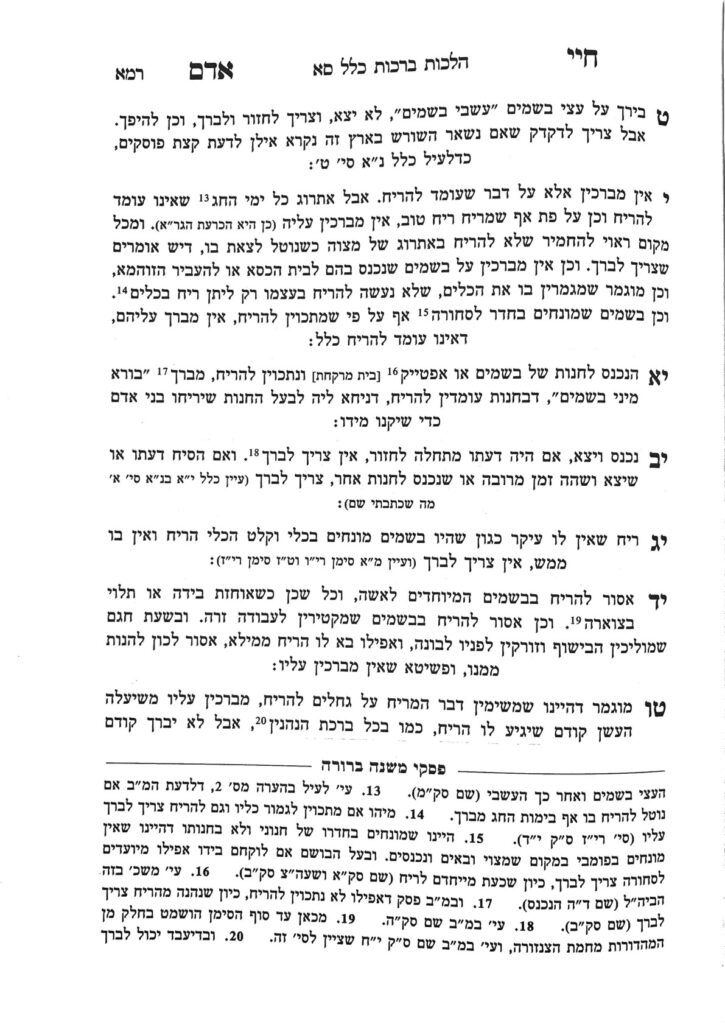We are beginning siman 9. The Chayei Adam writes that if one recites borei isvei besamim on an item which requires the bracha borei atzei besamim, or vice versa, they are not yotzei, and one must recite the correct bracha.
This halacha contrasts the halachos of haeitz and haadama. We have learned that if one recites haeitz on a food which requires a haadama, they are not yotzei. However, if one recites haadama on a food which requires a haeitz, they are yotzei bedieved, because haeitz foods come from the ground as well. The halacha is different regarding smells because the bracha on a smell is not made on the source from which the item originates, but on the inherent qualities of the item. Since an eisev item is not an eitz item, and vice versa (i.e., since an item which grows on a tree does not have the qualities of an item which grows as a grass, and vice versa), one is not yotzei in either direction.
The Chayei Adam adds that if the root of the item remains in the ground from year to year, some poskim hold that it is considered a tree. To explain, although in our case the halacha theoretically is that one must remake the bracha, we have learned (shiur 1177) that the criteria for defining whether an item is atzei besamim or isvei besamim is a machlokes poskim.
Regarding food, we learned that the criteria for making haeitz depended on whether the root remained in the ground from year to year. There is a machlokes rishonim whether it is sufficient for the root to remain, or whether a part of the trunk must remain as well. Additionally, there is a machlokes achronim how we pasken. Due to the machlokes rishonim, any item whose roots remain without any of the trunk is haadama. Therefore, for example, the Shulchan Aruch writes that bananas are haadama because only the roots remain.
Regarding smells, there is a machlokes poskim whether we use the same criteria as we do for haeitz and haadama in determining whether an item receives the bracha of isvei besamim or atzei besamim. This machlokes notwithstanding, the Chayei Adam wrote previously (shiur 1177) that even if an item needs to be replanted from year to year, if the trunk is hard, it receives the bracha of atzei besamim. Over here, the Chayei Adam is discussing a trunk which is soft, but remains from year to year. If some of the trunk remains, the bracha is unquestionably borei atzei besamim. If only the roots remain, the bracha is dependent on the machlokes poskim whether we extend the criteria of haeitz and haadama to isvei and atzei besamim. Therefore, the Chayei Adam waited until this siman to discuss the case of a soft trunk where only the roots remain from year to year, because due to the safeik which emanates from the machlokes poskim, if one made the bracha atzei besamim instead of isvei besamim, one would not remake the bracha. Since there are rishonim who hold that the criteria for haeitz and haadama extend to atzei and isvei besamim, one is yotzei according to some opinions in this case, so one does not remake the bracha out of safeik.
Summary
- If one recites borei isvei besamim on an item which requires the bracha borei atzei besamim, or vice versa, they are not yotzei and must recite the proper bracha.
- However, if one recites borei atzei besamim on an item which should be borei isvei besamim , before corrects themselves, care must be taken to ensure that it was truly an incorrect bracha according to all poskim. If the roots of the item remain in the ground from year to year, since it is a machlokes poskim which bracha should be recited, one would not repeat the bracha.



